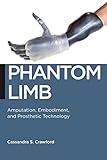Phantom Limb : Amputation, Embodiment, and Prosthetic Technology / Cassandra S. Crawford.
Material type: TextSeries: Biopolitics ; 16Publisher: New York, NY : New York University Press, [2014]Copyright date: ©2014Description: 1 online resourceContent type:
TextSeries: Biopolitics ; 16Publisher: New York, NY : New York University Press, [2014]Copyright date: ©2014Description: 1 online resourceContent type: - 9780814789285
- 9780814764824
- 617.9 23
- RD553 .C88 2016
- online - DeGruyter
| Item type | Current library | Call number | URL | Status | Notes | Barcode | |
|---|---|---|---|---|---|---|---|
 eBook
eBook
|
Biblioteca "Angelicum" Pont. Univ. S.Tommaso d'Aquino Nuvola online | online - DeGruyter (Browse shelf(Opens below)) | Online access | Not for loan (Accesso limitato) | Accesso per gli utenti autorizzati / Access for authorized users | (dgr)9780814764824 |
Browsing Biblioteca "Angelicum" Pont. Univ. S.Tommaso d'Aquino shelves, Shelving location: Nuvola online Close shelf browser (Hides shelf browser)

|

|

|

|

|

|

|
||
| online - DeGruyter Pray the Gay Away : The Extraordinary Lives of Bible Belt Gays / | online - DeGruyter The Wrongs of the Right : Language, Race, and the Republican Party in the Age of Obama / | online - DeGruyter Spectacular Girls : Media Fascination and Celebrity Culture / | online - DeGruyter Phantom Limb : Amputation, Embodiment, and Prosthetic Technology / | online - DeGruyter Strange Neighbors : The Role of States in Immigration Policy / | online - DeGruyter Your Ad Here : The Cool Sell of Guerrilla Marketing / | online - DeGruyter Meeting Once More : The Korean Side of Transnational Adoption / |
restricted access online access with authorization star
http://purl.org/coar/access_right/c_16ec
Phantom limb pain is one of the most intractable and merciless pains ever known-a pain that haunts appendages that do not physically exist, often persisting with uncanny realness long after fleshy limbs have been traumatically, surgically, or congenitally lost. The very existence and "naturalness" of this pain has been instrumental in modern science's ability to create prosthetic technologies that many feel have transformative, self-actualizing, and even transcendent power. In Phantom Limb, Cassandra S. Crawford critically examines phantom limb pain and its relationship to prosthetic innovation, tracing the major shifts in knowledge of the causes and characteristics of the phenomenon. Crawford exposes how the meanings of phantom limb pain have been influenced by developments in prosthetic science and ideas about the extraordinary power of these technologies to liberate and fundamentally alter the human body, mind, and spirit. Through intensive observation at a prosthetic clinic, interviews with key researchers and clinicians, and an analysis of historical and contemporary psychological and medical literature, she examines the modernization of amputation and exposes how medical understanding about phantom limbs has changed from the late-19th to the early-21st century. Crawford interrogates the impact of advances in technology, medicine, psychology and neuroscience, as well as changes in the meaning of limb loss, popular representations of amputees, and corporeal ideology. Phantom Limb questions our most deeply held ideas of what is normal, natural, and even moral about the physical human body.
Mode of access: Internet via World Wide Web.
In English.
Description based on online resource; title from PDF title page (publisher's Web site, viewed 01. Nov 2023)


